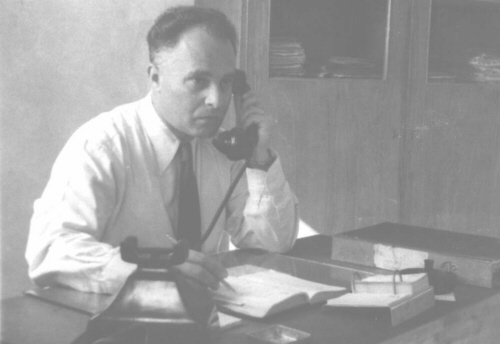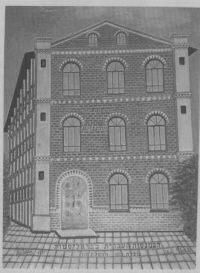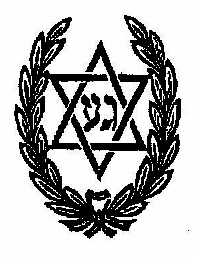The following is a precis of the article sent to the Gymnasium in 1939
by Engineer Yaacov Semiatitzki, who Hebraized his name to Samid in
September 1940. The article was never published because the war broke
out.
This week I received the announcement of the twentieth anniversary of
the Bialystok Hebrew Gymnasium. To tell the truth, a strange and
indescribable feeling came over me at the moment that my eyes dwelt on
this announcement. How come that it was not obvious to me how long the
institution, where I was educated and reached maturity, had existed,
and that I was unaware of the anniversary year which was approaching?
Can one draw the conclusion that I had completely abandoned the "Temple
of my Youth", had smashed its high places, and destroyed its altars in
my heart? Or perhaps the opposite is true.

Precisely because a living
and organic connection remains between myself and the school and I feel
its very being in all my deeds and conduct -
perhaps because of this, I am not in the habit of counting the years
and making note of periods and dates associated with it, just as there
is no restriction or limit to one's innermost soul. For a high school
is not like a university. It is true that the latter provides one with
a spade with which to dig, but the former bestows that "heightened
spirituality", which at times of rest and calm, provides a never-ending
source of elevated spiritual experience. The high school creates and
assembles the material foundations from which the university moulds
form and character.
"Knowledge acquired in childhood" is the decisive
factor which determines the essence of a person in the future. These
ideas disturbed my thoughts throughout that same workday on which I
received the announcement. The knowledge of the school's anniversary
gave me no respite, and disturbed my mental equilibrium. Wherever I
went, pictures appeared before me from the eight years I spent studying
at the school. I therefore decided to put my feelings on paper in
order to share them with the teachers and students. And what a
surprise! That evening, when I came to put this into practical
expression, and to convey some of my innermost thoughts - I saw that my
pen was dry.
All day I had butterflies in my stomach and my heart was
almost bursting with excitement that it could hardly contain, and now
their place had been taken by an empty void. Perhaps the reason for
this phenomenon was the sense of distance, both geographical and of
time, and it was difficult to find the appropriate idiom and suitable
tone. Indeed, it is ten years since I left the school, and during the
whole of that period I was not only outside Bialystok, but outside
Poland. Only once, four years ago, did I meet teachers and students,
when I gave them my impressions from abroad. Great changes and
transformations have taken place in the course of my life since then:
I exchanged my bench at school for one at the university, and later an
office desk; other writing and drawing instruments took the place of my
pen. And perhaps one can find the reason in the confused times which
we are passing through all over the world, and it is hard to disconnect
oneself from nightmarish events and the heavy burden of the yoke of
responsibility - even in the realm of thoughts?
Day-to-day living
demands strength, and the devotion of all one's energies to be on the
alert. May
one hide in the shadow of the wings of the past from the
sound of shooting and the fire in the cornfield? Totally immersed in
the labyrinth of these questions, and searching for a reason which
would explain this strange phenomenon, my train of thought brought me
to the spring, to that same "spring" known to us all, from which "the
Children of Israel drew courage and strength" - and instantly, my pen
was filled with black, bubbling ink. Surely the educational
institution is one golden link in the chain of our renaissance, one of
the foundation stones of our national Zionist edifice, and it deserves
praise for producing from within it, youth, permeated with lofty
ideals, who are prepared to defend the spiritual and cultural assets of
their people.
Our suffering and our defensive campaign acquires
encouraging sense and meaning when we see these national assets! Over
all this hovers the question, has the school justified its existence,
and was it correct in the path that it took, and on the other hand,
have all the graduates of the school fulfilled the hopes that were
placed in them? The school, when it set itself the aim of educating a
generation deeply rooted in our tradition, and which would be a
synthesis of Hebrew knowledge and European culture - not without
difficulty, found the correct and appropriate path for this mission.
It had to overcome many obstacles and difficulties: a shortage of
suitable teachers, absence of proper text books, lack of settled
tradition and method, and in addition, external interference. Happily,
one can state that the institution stood firm constantly during its
campaign, strove tirelessly to achieve the aim which it had set itself,
and did not choose the path of least resistance. In spite of the ill
winds which blew around it, trying to tempt it to abandon its main
purpose and to adjust to popular demand - it did not lower its stature
or alter its true nature.
It is sufficient to recall the
painful question which created a storm at the time, the matter of the
"Matura". The "Tarbut" institutions fought for equal government
rights, and in spite of the qualitative and quantitative improvements
which were introduced at the school, the government stood by its
refusal to award graduates the right to receive a state matriculation
certificate. After much lobbying, the government made a pretence of
being prepared to fulfil the request of the Hebrew schools, with "one
small condition": cutting the hours for teaching Hebrew and increasing
those of Polish. This condition, which struck at the very heart of the
institution, was decisively rejected by all. I am reminded of the
protest strike which was declared when I was in the Seventh Class,
against surrendering to the authorities; because at that time there was
a fear that, under pressure exerted by individual parents, the
institution would agree to accept these conditions. In spite of the
fact that we students were the sufferers in this unjust state of
affairs, we made sure that the sanctity of the school would not be
desecrated and, even if it meant that our future path would be made the
harder, and that we would have to multiply our efforts in order to
reach a reasonable status in life, we decided that we would not allow
our Hebrew spirit to be denied. It would be superfluous to describe
the end of this battle, which was distinguished by achievements of both
a partial and a permanent nature.
In the course of time, the "Polish
Matura" lost its magic power of attraction. The tide turned: the
Hebrew school proved its worth and succeeded in convincing the general
public of its high standard. Its graduates became the subject of envy
in the eyes of young students everywhere. The high educational
standard of the school should also be mentioned. I am familiar with
educational institutions in Eretz Yisrael, and can vouch for the fact
that neither our school's curriculum nor its teaching methods fall
below their standard. The "spiritual baggage" which Bialystok
graduates carry with them when they leave the school is of no less
value, and is no smaller, than that of the graduates of institutions in
Eretz. I would like to conclude by wishing the Hebrew Gymnasium
success and prosperity, and offer congratulations - to the teachers,
trusting that they will derive satisfaction from their work - and to
the students, in the hope that they will use their knowledge for the
good of their people.
May this blessing, sent from the land of our
aspirations - the source of blessings and consolations - also bear on
its wings that spirit which beats in the hearts of the builders of our
Land, and cause it to rest on all who support the establishment of
national educational institutions.
|





